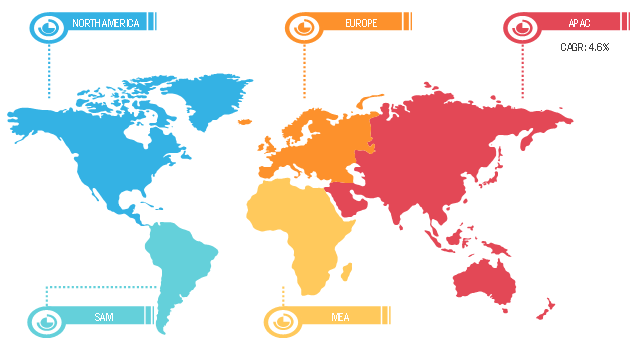The scope of our recent study on the “Automotive Fabric Market to 2027 – COVID-19 Impact and Global Analysis – by Component (Carpet, Headliner, Hood liner, Insulation, Seat Covering Material and Others) and Material (Textiles, Artificial Leather, Genuine Leather and Artificial Suede)” includes the factors fueling the market growth, revenue estimation and forecast, and market share analysis, along with the identification of significant market players and their key developments.
Get Sample PDF Copy: https://www.theinsightpartners.com/sample/TIPRE00006211/
Automotive fabrics are available in the form of woven or nonwoven and coated or composite type. These fabric materials are quite flexible, and they possess features such as UV ray resistance and cold cracking. They are durable and lightweight in design. Automotive fabrics aim to provide seating comfort, as well as promote the overall aesthetic appearance and experience. The materials used in preparation of such fabrics play a significant role in promoting car efficiency along with ensuring safety and adding to overall quality of the vehicle.
Aunde Group SE; Bader Gmbh And Co. KG; Borgstena Gruppen; Boxmark Leather; Classic Soft Trim; CMI Enterprises; DK Leather Corporation Berhad; Grupo Copo; JBS Couros; Kyowa Leather Cloth; Lear Corporation; Martur; Moriden America, INC.; Sage Automotive Interiors INC.; Scottish Leather; Seiren Co., Ltd; Shawmut Corporation; Suminoe Textile Co., LTD; TB Kawashima CO., LTD; and Vulcaflex S.P.A. are among the well-established players in the global automotive fabric market.
Based on material, the automotive fabric market is categorized into textiles, artificial leather, genuine leather and artificial suede. In 2019, the covering material segment held the largest share of the global automotive fabric market. Textile segment held the largest share in the global automotive fabric market. Textiles are majorly used in carpets and seat covering materials. The type of seat cover used depend upon automobile model, customer requirements and desired patterns of the upholstery. Tri-laminate polyester is predominantly used as automotive seat fabric for almost all types of car seats. The use of woven seat cover has gain traction amongst automobile textile for seat covering components. Textile helps to fill-in the gaps spaces and cladding the seat constructions with different composite materials such as woven fabric, polyurethane foam, knitted fabrics and other, hence, contributing to the overall to ergonomic design of vehicle.
The global automotive fabric market is segmented into five main regions—North America, Europe, Asia Pacific (APAC), Middle East & Africa (MEA), and South America. In 2019, Asia Pacific contributed to the largest share in the global automotive fabric market. The growth of the automotive fabric market in this region is primarily attributed to the presence of strong industrial base along with prominent manufactures significantly contributing to market growth. Growth of automotive sector in the developing countries such as China and India provide lucrative opportunities for the growth of the automotive fabric market in Asia Pacific. Further, rapid urbanization along with significant growth in population is also favor the market growth in the region. The easy accessibility and availability of raw materials coupled with cheap labor and low production cost are yet another factor that bode well the market demand in the region.
Buy the Complete Report: https://www.theinsightpartners.com/buy/TIPRE00006211/
Impact of COVID-19 Pandemic on Automotive Fabric Market
Coronavirus pandemic first began in Wuhan (China) in December 2019, and since then, it has spread across the globe. As of April 2021, the US, India, Brazil, Russia, the UK, France, Spain, Italy, Turkey, Germany, Colombia, and Argentina are among the worst-affected countries in terms of confirmed cases and reported deaths. The coronavirus pandemic has affected economies and industries in various countries due to lockdowns, travel bans, and business shutdowns. The chemicals & materials industry is one of the major industries suffering serious disruptions such as supply chain breaks, technology events cancellations, and office shutdowns as a result of this pandemic. The shutdown of various plants and factories in leading regions such as North America, Europe, Asia Pacific, South America, and the Middle East & Africa has affected the global supply chain and negatively impacted the manufacturing, delivery schedules, and sales of various goods. Furthermore, various companies have already announced possible delays in product deliveries and slump in future sales of their products. In addition to this, the global travel bans imposed by countries in Europe, Asia, and North America are affecting the business collaborations and partnerships opportunities. All these factors are anticipated to affect the chemical & materials industry in a negative manner, and thus, act as restraining factor for the growth of various markets related to this industry in the coming months. The market for automotive fabrics is impacted by the pandemic due to shortfall in production along with limited transportation facilities.
Media Contact
Company Name: The Insight Partners
Contact Person: Sameer Joshi
Email: Send Email
Phone: +1-646-491-9876
City: Pune
State: Maharashtra
Country: India
Website: https://www.theinsightpartners.com/

